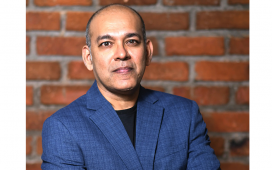 There are marketers, and then there’s Edward Matti, a man who’s worn many hats and made them all look good.
There are marketers, and then there’s Edward Matti, a man who’s worn many hats and made them all look good.
A certified financial planner turned entrepreneur, this managing partner at the thriving CCM Consultancy with offices in Dubai, New York, Montreal and Athens embodies the meaning of ‘energy that fills the room’.
Edward Matti believes social selling and digital mastery are an absolute must for brands to survive in today’s information-saturated market, where consumers have become their own market experts, consuming information from opinion leaders online and avidly following brands, often being keen to be a part of product ideation.
Digital mastery
He highlighted five key steps for digital mastery, beginning with the need for a strategy that aptly profiles the target audience followed by prospecting and identifying at least one touchpoint for the target, although he recommends that four is the ideal.
Audience build-up involves connecting in a meaningful and personalised way because that is what today’s brand audiences have come to expect.
Relationship building converts new connections into friends and fans and lastly the outreach stage is about making them an offer they can’t resist. But digital mastery is only one of five successful sales traits.
Storytelling is another and he exemplified it beautifully with ‘The Duck Factor’.

“Brands need to move beyond the implicit and onto doing above and beyond what is expected of them,” he said. This is something he had dubbed the ‘Duck Factor’.
He told a story of walking into a hotel room and as is his and perhaps many others’ ritual, checked the bathroom first.
To his surprise, he found a yellow rubber ducky there. At first, he thought it had been forgotten by a previous guest only to take a closer look and find a little note that read, ‘Enjoy simpler times’.
The hotel he had been booked in recognised that business travellers are often so busy and exhausted that such simple reminders of happy childhood moments could be triggers for a more relaxing experience.
That gesture alone set that particular hotel apart for him as one that truly understands being customer-centric. It was both impressive and delightful, not just implicit.
“Find ways to find the Duck Factor, “ Matti advised. “Moments of truth that distinguish you from each competitor.” This authentic customer-focused approach is part of being customer-centric, a third trait.
Sing Your Song
He said it is important to avoid ‘karaoke capitalism’ which is trying to own someone else’s idea. He gave the example of a bank that tried to adapt the Apple store set-up, much to the chagrin of its guests.
“Sing your song and sing it brilliantly,” simply means finding your unique selling point, and harnessing it loud and proud instead of trying to mimic the success story down the road even if their “best practices” are an ill-fit for your brand.
By Hannah Uwuzura









